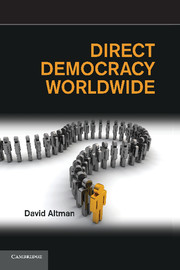Book contents
- Frontmatter
- Contents
- Tables
- Figures
- Preface and Acknowledgments
- Abbreviations
- 1 Direct Democracy at the Turn of the Century
- 2 Terms of the Debate Surrounding Direct Democracy
- 3 Myths and Facts behind the Use of Mechanisms of Direct Democracy
- 4 Direct Democracy within Nondemocratic Regimes
- 5 Direct Democracy within Weak Democracies
- 6 Direct Democracy within Democracies
- 7 Uruguayan Citizen-Initiated Mechanisms of Direct Democracy as Agents of Vertical Accountability
- 8 Conclusions
- Appendix
- References
- Index
2 - Terms of the Debate Surrounding Direct Democracy
Published online by Cambridge University Press: 01 March 2011
- Frontmatter
- Contents
- Tables
- Figures
- Preface and Acknowledgments
- Abbreviations
- 1 Direct Democracy at the Turn of the Century
- 2 Terms of the Debate Surrounding Direct Democracy
- 3 Myths and Facts behind the Use of Mechanisms of Direct Democracy
- 4 Direct Democracy within Nondemocratic Regimes
- 5 Direct Democracy within Weak Democracies
- 6 Direct Democracy within Democracies
- 7 Uruguayan Citizen-Initiated Mechanisms of Direct Democracy as Agents of Vertical Accountability
- 8 Conclusions
- Appendix
- References
- Index
Summary
There is no doubt that democracy constitutes a key component of the current debate in political science. Most of the comparative literature analyzes elections (a sine qua non component of any democratic regime) and the surrounding rights or preconditions for them to be fair and free. However, less attention has been devoted in the literature to what happens between elections. Although some key institutions and processes have been examined (e.g., rule of law; human, social, and economic rights), a central dimension of democracy – popular sovereignty – has been surprisingly absent in mainstream comparative political science debate. Popular sovereignty is critical because representative institutions generate incentives for narrow and selfish interests that must be controlled by citizens. Despite MDDs being either loved or hated institutions, this chapter shows that many of the critical arguments within the discussion about direct democracy are based, to an important degree, on stigmatization of how both direct and representative democracy work.
This chapter has two sections. The first section shows how free and fair elections are a necessary but not sufficient condition for democracy to flourish. For democracy to re-enchant citizens, serious consideration must be given to the popular sovereignty dimension of democracy. I claim that this can be done by returning sovereign power to the citizens. Of course, this sovereign power has its risks; thus, in the following section I tackle the most important apprehensions associated with the direct-democratic game.
- Type
- Chapter
- Information
- Direct Democracy Worldwide , pp. 32 - 59Publisher: Cambridge University PressPrint publication year: 2010



